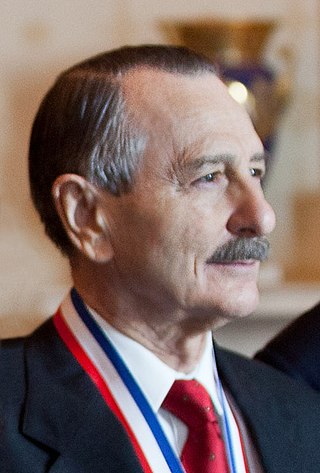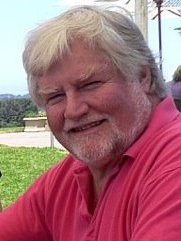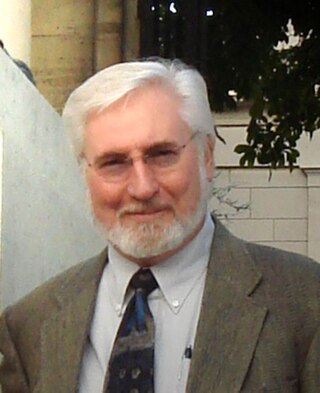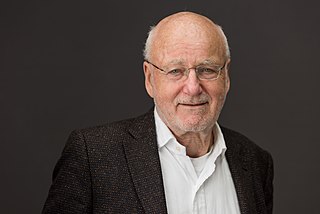Related Research Articles

A genetic chimerism or chimera is a single organism composed of cells with more than one distinct genotype. In animals and human chimeras, this means an individual derived from two or more zygotes, which can include possessing blood cells of different blood types, and subtle variations in form (phenotype). Animal chimeras are produced by the merger of two embryos. In plant chimeras, however, the distinct types of tissue may originate from the same zygote, and the difference is often due to mutation during ordinary cell division. Normally, genetic chimerism is not visible on casual inspection; however, it has been detected in the course of proving parentage. In contrast, an individual where each cell contains genetic material from two organisms of different breeds, varieties, species or genera is called a hybrid.
Quantitative psychology is a field of scientific study that focuses on the mathematical modeling, research design and methodology, and statistical analysis of psychological processes. It includes tests and other devices for measuring cognitive abilities. Quantitative psychologists develop and analyze a wide variety of research methods, including those of psychometrics, a field concerned with the theory and technique of psychological measurement.
Stuart Alan Newman is a professor of cell biology and anatomy at New York Medical College in Valhalla, NY, United States. His research centers around three program areas: cellular and molecular mechanisms of vertebrate limb development, physical mechanisms of morphogenesis, and mechanisms of morphological evolution. He also writes about social and cultural aspects of biological research and technology.
Steven C. Hayes is an American clinical psychologist and Nevada Foundation Professor at the University of Nevada, Reno Department of Psychology, where he is a faculty member in their Ph.D. program in behavior analysis. He is known for developing relational frame theory, an account of human higher cognition. He is the co-developer of acceptance and commitment therapy (ACT), a popular evidence-based form of psychotherapy that uses mindfulness, acceptance, and values-based methods, and is the co-developer of process-based therapy (PBT), a new approach to evidence-based therapies more generally. He also coined the term clinical behavior analysis.

John Edgar Dick is Canada Research Chair in Stem Cell Biology, Senior Scientist at the Princess Margaret Cancer Centre, University Health Network and Professor in the Department of Molecular Genetics at the University of Toronto in Canada. Dick is credited with first identifying cancer stem cells in certain types of human leukemia. His revolutionary findings highlighted the importance of understanding that not all cancer cells are the same and thus spawned a new direction in cancer research. Dick is also known for his demonstration of a blood stem cell's ability to replenish the blood system of a mouse, his development of a technique to enable an immune-deficient mouse to carry and produce human blood, and his creation of the world's first mouse with human leukemia.

Roger S. Fouts is a retired American primate researcher. He was co-founder and co-director of the Chimpanzee and Human Communication Institute (CHCI) in Washington, and a professor of psychology at the Central Washington University. He is best known for his role in teaching Washoe the chimpanzee to communicate using a set of signs taken from American sign language.
Connie Jean Eaves, CorrFRSE was a Canadian biologist with significant contributions to cancer and stem cell research. Eaves was a professor generics of genetics at the University of British Columbia and was also the co-founder with Allen C Eaves of Terry Fox Laboratory.
James T. Richardson is Emeritus Foundation Professor of Sociology and Judicial Studies at the University of Nevada, Reno. He is a sociologist with legal training, who has edited and co-edited over a dozen books and has authored more than 300 scholarly journal articles and book chapters. Areas in which he is specialized include the sociology of religion, the sociology of law, religion and human rights, social control of religions, social psychology of law, social and behavioral science evidence, and treatment of Muslims in courts. Richardson has been an outstanding figure in American sociology of religion for decades, and is considered to be one of the most prominent figures in the field of law and religion in the World. He is also a known scientific critic of brainwashing theories.

Ralph Lawrence Brinster is an American geneticist, National Medal of Science laureate, and Richard King Mellon Professor of Reproductive Physiology at the School of Veterinary Medicine, University of Pennsylvania.
Paola S. Timiras, born Paola Silvestri, was an endocrinologist studying stress.

Glenn Daniel Wilson is a psychologist best known for his work on attitude and personality measurement, sexual attraction, deviation and dysfunction, partner compatibility, and psychology applied to performing arts. He is a fellow of the British Psychological Society and makes frequent media appearances as a psychology expert, especially in TV news and documentaries.
Theodore Garland Jr. is a biologist specializing in evolutionary physiology at the University of California, Riverside.

C. Richard (Dick) Tracy is an American biologist, a professor of biology at the University of Nevada, Reno.
Gail Wight is an American new media artist and professor, whose work fuses art with biology, neurology, and technology. Popular media Wight uses to create art include, drawing and painting, electronic sculpture, interactive sculpture, video and living mediums. Since 2003, Wight has taught at Stanford University in the Department of Art.
Jacques Ruffié was a French haematologist, geneticist, and anthropologist. He founded a discipline, called blood typing, which allowed the study of blood characteristics to find the history of the people, their migration and their successive interbreeding. He was a colleague and great personal friend of Michel Foucault at the College de France; Foucault mentions him in a newly discovered essay review of a book that Ruffié published in 1976, entitled De la biologie à la culture.
Justin Smith-Ruiu is an American-Canadian professor of history and philosophy of science at the Université Paris Cité. His primary research interests include Leibniz, Post-structuralism, early modern philosophy, history and philosophy of biology, classical Indian philosophy, the history and philosophy of anthropology.
Ravi Salgia is a translational thoracic oncologist, clinician/scientist, and academician.

Bob Löwenberg is a clinical hematologist/investigator. He is Professor of Hematology at Erasmus University Rotterdam.